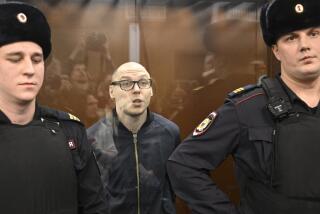Andrei Voznesensky dies at 77; daring and popular Russian poet
- Share via
Russian poet Andrei Voznesensky, who rose to prominence during the thaw that followed Soviet dictator Josef Stalin’s death, died in Moscow on Tuesday. He was 77.
Voznesensky had been reclusive over the last few years, and friends said he was suffering from an unidentified illness.
Prime Minister Vladimir Putin said in a telegram to Voznesensky’s widow that the poet had “truly become a person of dominant influence.”
“His poetry and prose became a hymn to freedom, love, nobility and sincere feelings,” Putin said.
Voznesensky was born May 12, 1933, in Moscow. His father was an engineer and his mother a teacher. An architect by education with a passion for painting, he finally chose to become a poet and published his first work in 1958.
“Your entrance into literature was swift and turbulent. I am glad I’ve lived to see it,” Russian poet and novelist Boris Pasternak, a future Nobel Prize winner who was oppressed in his own country, wrote to Voznesensky when he was 14. The teenage poet had sent him early verses asking for his opinion.
Voznesensky, like many other talented young writers, poets and painters from the so-called generation of the 1960s, enjoyed a whiff of freedom amid the political thaw after three decades of Stalin’s brutal rule.
Soviet leader Nikita Khrushchev released hundreds of thousands of political prisoners from gulag camps, and in 1956 he denounced Stalin’s personality cult during a party congress.
Voznesensky quickly won admirers abroad when he was allowed to travel to Europe and the United States, meeting Allen Ginsberg, Arthur Miller, Marilyn Monroe and Robert Kennedy.
But by the early 1960s the official line had hardened again.
In December 1962, Voznesensky was among a group of young Russian intellectuals invited by Khrushchev to a Communist Party reception hall for what effectively became their public flogging in front of the gloating party elite.
Gruff and poorly educated, Khrushchev made no effort to understand fresh trends in Soviet art, choosing instead to threaten intellectuals with persecution and exile.
Berating Voznesensky — who stood pale during the tirade — as a capitalist agent, a fiery Khrushchev shouted: “Just look at this new Pasternak!”
“You want to get a [foreign] passport tomorrow? You want it? And then go away, go to the dogs! Go, go there,” the party boss shouted to rapturous applause from his communist retinue.
“I am a Russian,” Voznesensky whispered.
Despite periods of disgrace, his poems were published in huge volumes in Soviet days and were invariably a success.
He experimented with eccentric metaphors, intricate rhythmical systems and audio effects. His unusual rhymes and bold metaphors contrasted sharply with other Soviet poetry.
His books of poems included “The Triangular Pear,” “Antiworlds,” “Stained-glass Master,” “Violoncello Oakleaf,” “Videoms and Fortune Telling by the Book.”
Some of his works were turned into theater productions, including “Antiworlds,” “Save Your Faces” and “Juno and Avos,” both in Russia and abroad.
Like fellow poet Yevgeny Yevtushenko, Voznesensky’s readings once filled stadiums, but his popularity flagged with the increasing freedom of the glasnost era in the late 1980s.
Survivors include his wife, Zoya Boguslavskaya.
More to Read
Sign up for Essential California
The most important California stories and recommendations in your inbox every morning.
You may occasionally receive promotional content from the Los Angeles Times.













